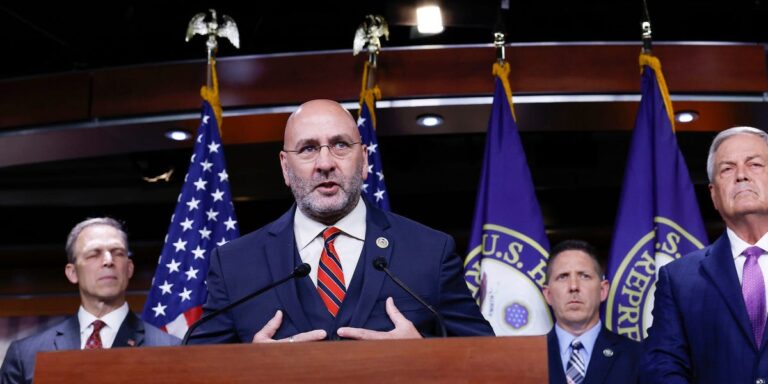- 20 House members, mostly Republican, voted against federal funding for their districts.
- It shows the limits of the “earmark” process, which aims to incentivize lawmakers to vote for bills.
- “When I cast a vote on a bill, it has to be reflective of my core principles,” said one Republican.
As Rep. Clay Higgins walked toward the House floor to vote on a $1.2 trillion government funding bill on Friday, the Louisiana Republican explained why his “earmarks” couldn’t get him to vote yes.
“Ultimately, I don’t control what the final language of the total funding bill will be,” said Higgins. “When I cast a vote on a bill, it has to be reflective of my core principles.”
Higgins voted against the bill, despite securing $2.3 million in federal funding for an emergency operations center at the port in Morgan City, Louisiana.
He was one of 20 House members — 15 Republicans and 5 Democrats — who voted against Friday’s government funding bill despite securing so-called “earmarks,” known officially as congressionally directed spending.
Earmarks, which allow lawmakers to funnel spending toward specific projects in their districts, are controversial. Republicans banned them in 2011 amid accusations of fraud and waste, but Democrats brought them back in 2021. One argument in favor of earmarks is that they make high-stakes legislation easier to pass, providing lawmakers a stake in major bills and giving leadership a way to corral votes.
But recent votes show that there are limits to that logic.
Friday’s bill encompassed roughly 70% of federal government funding, including the Pentagon, the State Department, the Department of Homeland Security, and other agencies.
The other 30% was contained in a separate funding bill passed roughly two weeks ago, but that bill contained far more earmarks, especially for House members. Nonetheless, 42 House members who secured earmarks voted against it anyway, 40 of whom were Republicans.
Mandel Ngan / AFP via Getty Images
The government funding bill, a compromise hashed out between the Democratic-controlled Senate and the Republican-controlled House, barely passed with the required two-thirds majority on Friday. Both progressives and Republicans found reasons to oppose it.
Republicans protested that the bill did not include certain hardline immigration-related policy provisions, that culture war “riders” had been stripped from the compromise legislation, and as always, that the federal government is spending too much money.
Ultimately, most of the GOP conference voted against the bill, and Rep. Marjorie Taylor Greene of Georgia is now threatening to oust Speaker Mike Johnson over it.
22 Democrats, the vast majority of whom are members of the Congressional Progressive Caucus, voted against the bill in protest of increased military funding, increased funding for border enforcement measures, and a one-year ban on funding for the UN Relief and Works Agency (UNRWA), a key provider of aid to Palestinians, particularly in Gaza.
That included Rep. Pramila Jayapal of Washington, the chairwoman of the caucus, who voted against the bill despite securing $1.3 million for seismic structural upgrades at the Seattle Public Library.
“We are consistently rewarding waste, fraud, and abuse in the Pentagon by providing them with a larger budget year after year,” Jayapal said in a statement.
Republicans in particular have faced accusations in recent years of “voting no and taking the dough” — not just when it comes to earmarks, but for celebrating funding from bills that they wholly opposed.
Already, Republicans including Greene and Rep. Lauren Boebert of Colorado have bragged about earmarks they secured in government funding bills this week, even though they voted against the final product.
Here are the 15 Republicans who voted against the bill, despite securing earmarks:
-
Brian Babin of Texas
-
Gus Bilirakis of Florida
-
John Curtis of Utah
-
Mike Ezell of Mississippi
-
Garrett Graves of Louisiana
-
Michael Guest of Mississippi
-
Diana Harshbarger of Tennessee
-
Clay Higgins of Louisiana
-
Trent Kelly of Mississippi
-
Burgess Owens of Utah
-
Mike Rogers of Alabama
-
Chris Smith of New Jersey
-
Greg Steube of Florida
-
Jeff Van Drew of New Jersey
-
Randy Weber of Texas
Here are the 5 Democrats who did the same:
-
Andre Carson of Indiana
-
Joaquin Castro of Texas
-
Pramila Jayapal of Washington
-
Summer Lee of Pennsylvania
-
Nydia Velázquez of New York



